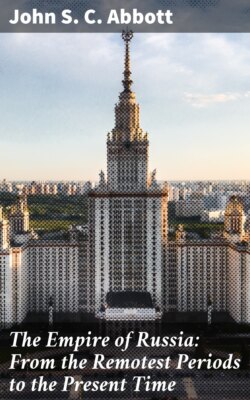The Empire of Russia: From the Remotest Periods to the Present Time

Реклама. ООО «ЛитРес», ИНН: 7719571260.
Оглавление
John S. C. Abbott. The Empire of Russia: From the Remotest Periods to the Present Time
The Empire of Russia: From the Remotest Periods to the Present Time
Table of Contents
INDEX
Отрывок из книги
John S. C. Abbott
Published by Good Press, 2019
.....
Vlademer had then ten sons. Three others were afterwards born to him. He divided his kingdom into ten provinces or states, over each of which he placed one of these sons as governor. On the frontiers of the empire he caused cities, strongly fortified, to be erected as safeguards against the invasion of remote barbarians. For several years Russia enjoyed peace with but trivial interruptions. The character of Vlademer every year wonderfully improved. Under his Christian teachers he acquired more and more of the Christian spirit, and that spirit was infused into all his public acts. He became the father of his people, and especially the friend and helper of the poor. The king was deeply impressed with the words of our Saviour, "Blessed are the merciful, for they shall obtain mercy," and with the declaration of Solomon, "He who giveth to the poor lendeth to the Lord."
In the excess of his zeal of benevolence he was disposed to forgive all criminals. Thus crime was greatly multiplied, and the very existence of the state became endangered. The clergy, in a body, remonstrated with him, assuring him that God had placed him upon the throne expressly that he might punish the wicked and thus protect the good. He felt the force of this reasoning, and instituted, though with much reluctance, a more rigorous government. War had been his passion. In this respect also his whole nature seemed to be changed, and nothing but the most dire necessity could lead him to an appeal to arms. The princess Anne appears to have been a sincere Christian, and to have exerted the most salutary influence upon the mind of her husband. In the midst of these great measures of reform, sudden sickness seized Vlademer in his palace, and he died, in the year 1015, so unexpectedly that he appointed no successor. His death caused universal lamentations, and thousands crowded to the church of Notre Dame, to take a last look of their beloved sovereign, whose body reposed there for a time in state, in a marble coffin. The remains were then deposited by the side of his last wife, the Christian princess Anne, who had died a few years before. The Russian historian, Karamsin, says:
.....